Summary
- Zimbabwe's army takes over the national broadcaster, ZBC
- BBC correspondent says it has "all the elements of a coup"
- President Robert Mugabe is safe but reportedly being held
- The army challenged Mr Mugabe after he sacked the vice-president
- Finance Minister Ignatius Chombo among those reportedly arrested
Live Reporting
AFP
This is all about the leadership succession, as President Robert Mugabe's powers finally falter.
The people who fought in the 1970s guerrilla war against white-minority rule still dominate Zimbabwe's government and especially its security forces, and they are worried about losing that power and the wealth it generates.
In his statement on Monday, army chief Gen Constantino Chiwenga warned against the "purging, which is clearly targeting members of the party with a liberation background".
This was obviously a reference to the sacking last week of Mr Mugabe's once loyal deputy, Emmerson Mnangagwa, a former defence minister, spy chief and veteran of the war of independence.
He and First Lady Grace Mugabe, who is four decades younger than her husband, had been seen as the main candidates to succeed Mr Mugabe.
Mrs Mugabe's supporters are known as Generation 40 or G40 - a name which signals a changing of the guard in Zimbabwe, at least partially, 37 years after independence.
So this military action is the old guard reasserting its authority.
Mr Mugabe was the political leader of the guerrilla war so the army always professed loyalty to him until he explicitly came out in favour of his wife.
AFP
President Robert Mugabe is "fine", South African leader Jacob Zuma has said.
Mr Zuma spoke to his 93-year-old counterpart, who said he was "confined to his home" but "fine", according to an official statement released by the South African president's office.
He is also in contact with the Zimbabwean Defence Force (ZDF), the statement said.
South Africa is planning on sending an envoy to speak to both sides.
Mr Zuma reiterated his earlier calls for "calm and restraint".
AFP
Oppostion MP Eddie Cross has told BBC News that he believes First Lady Grace Mugabe has fled to Namibia.
The Movement for Democratic Change (MDC) politician said that he understood she had been allowed to leave the country last night by the army.
He added that her choice of exile had been limited after she allegedly assaulted a model in the South African city of Johannesburg in August.
However, none of this has been officially confirmed by the army.
In his official statement, broadcast earlier on state television, Maj Gen Sibusiso Moyo said he could "assure the nation that his excellency the president... and his family are safe and sound and their security is guaranteed".
It has been suggested the first family were all being held together at home in Harare.
AFP
Jeffrey Moyo, a freelance journalist in Zimbabwe, has just told the BBC’s World Update programme that the military have blocked the main road leading to parliament – Nelson Mandela Avenue.
They have are also stopping traffic on another main road - Samora Michel Avenue – which is near President Robert Mugabe’s office, he says.
The army continues to rebroadcast its message on the state broadcasters (see earlier post), he says.
There are also rumours that sacked Vice-President Emmerson Mnangagwa might come back for annual Zanu-PF congress in December when he may stand to become the ruling party’s president, the reporter says.
Here is a mid-morning round up of the key points from Zimbabwe, where the army has taken control overnight.
- Maj Gen Sibusiso Moyo appeared on state television saying the army had taken control temporarily while they target "criminals around [President Robert Mugabe] who are committing crimes... that are causing social and economic suffering in the country"
- The move came after Mr Mugabe sacked his deputy, Emmerson Mnangagwa, in favour of his wife, Grace
- The Mugabes were safe, he added, as he emphasised this was "not a coup"
- A number of arrests have been made, including Zanu-PF youth wing leader and Finance Minister Ignatius Chombo
- There is calm in Harare, despite the presence of troops on the streets.
Read more: Zimbabwe crisis - what we know so far
Queues are forming outside banks in the Zimbabwean capital, Harare:
EPA
Pictures show people gathering in orderly queues along the pavement, hoping to withdraw money.
This is not an unusual sight in Zimbabwe, which replaced its own currency with US dollars in 2009 after a financial crash caused by hyperinflation.
However, in the last year a shortage of hard cash has left people queuing for hours in order to withdraw their money.
Reuters
Eddie Cross, an MP for the main Movement for Democratic Change opposition party, has told the BBC's Newsday programme that he believes the move by the military is being masterminded by former Vice-President Emmerson Mnangagwa, who was sacked last week:
He was chairman of the Joint Operations Command, which is a military structure here that's been in existence since independence.
Nothing like this could have happened without him. He's a brilliant operator and organiser.
I think very shortly we will hear that Mr Mugabe has retired from political life and he's appointed Emmerson Mnangagwa as his successor."
Zanu PF's UK representative Nick Mangwana has told the BBC's Newsday programme that President Robert Mugabe is still in charge - but the ruling party, which has been divided over who should succeed the 93-year-old leader, was being "realigned" as a result of the army's action:
Zimbabwe's state-run newspaper, The Herald, has finally posted a story on the events of the last few hours.
Its lead story is now on the army's takeover.
Herald Newspaper
You can read more about Zimbabwe state media reaction to today's events in these two posts:
AFP
Today's actions were sparked by a "purge" of officials in Zimbabwe's ruling Zanu-PF party, the military has said.
The most powerful victim of these so-called purges was Emmerson Mnangagwa, who was, until just over a week ago, the country's vice-president.
His removal cleared the way for Robert Mugabe's wife Grace to become his new deputy - and the most likely person to succeed him if and when he decides to step down.
She is now believed to being held, along with her husband, at their home in the capital, Harare.
But who is Grace Mugabe, and why is her rise so controversial? Here are a few quick facts:
- Began affair with Robert Mugabe, 41 years her senior, whilst working as a typist in state house
- Mr Mugabe later said his first wife Sally, who was terminally ill at the time, knew and approved of the relationship
- Married Mr Mugabe, her second husband, in 1996 in an extravagant ceremony. They have three children
- Nicknamed "Gucci Grace" by her critics who accuse her of lavish spending
- Along with her husband, is subject to EU and US sanctions, including travel bans
- Controversially received a PhD in September 2014 after just two months
- Appointed head of Zanu-PF women's wing in 2014
- Accused by a South African model of assaultin August 2017
Reuters
South African President Jacob Zuma says he is watching the events unfolding in neighbouring Zimbabwe with "great concern".
An official statement released by Mr Zuma's office called on the armed forces "to resolve the political impasse amicably".
In August, South Africa found itself drawn into its own fight involving the Mugabe family, when Grace Mugabe allegedly assaulted a model in a Johannesburg hotel room.
Mrs Mugabe was not prosecuted after Mr Zuma's government gave her diplomatic immunity.
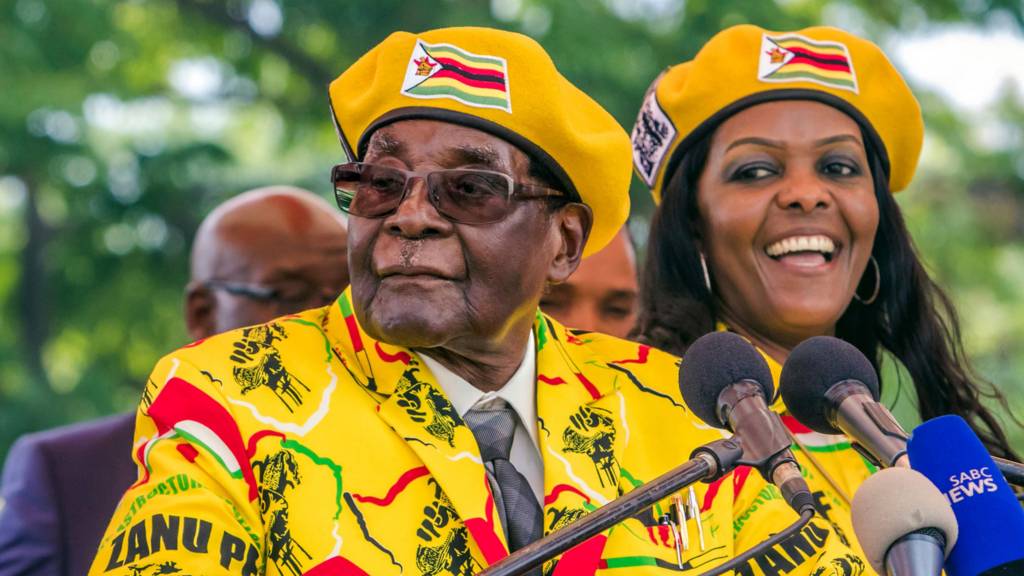

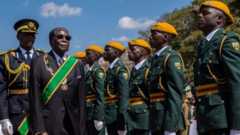
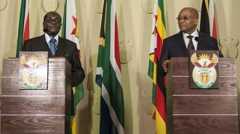
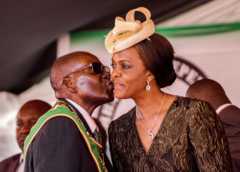
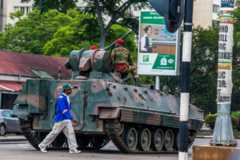
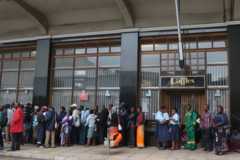
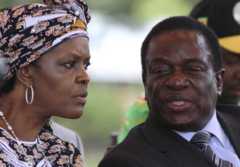

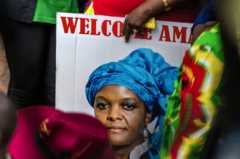
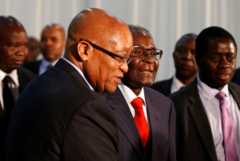
No comments:
Post a Comment